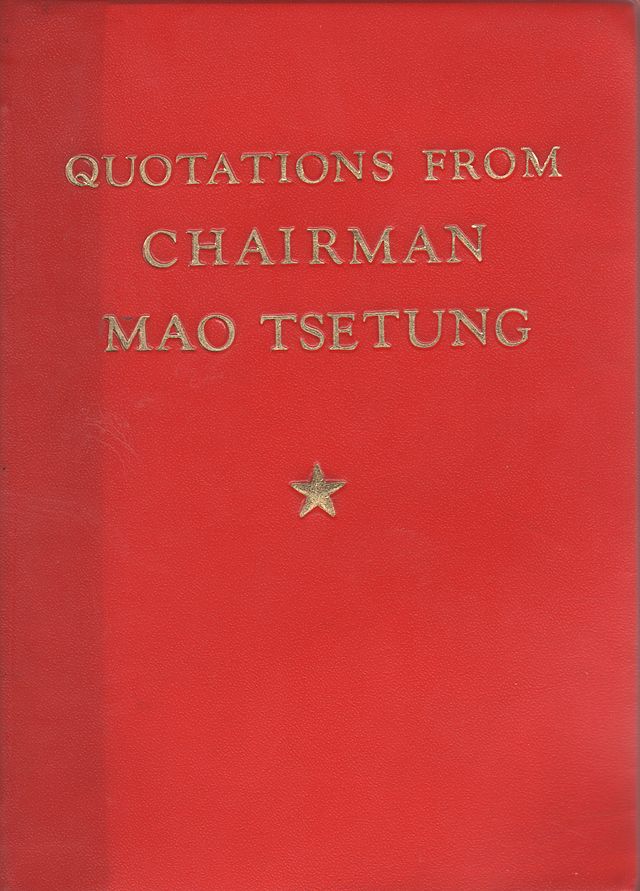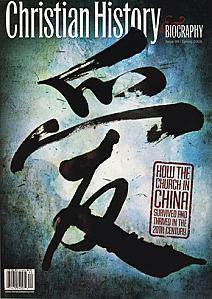WU WEIZUN PRAYED TO BE WORTHY OF CHRIST

[Wu Wuzein refused to read Mao's Little Red Book, shown above in an English version—Inhuman5 / public domain, Wikimedia]
IN 1951, elders of the Little Flock Church denied Wu Weizun the bread and wine of Communion. As far as they were concerned, he had abandoned the faith. When Chinese communists had forced Christians to denounce each other, Wu did so with such exaggeration that the meeting descended into chaos and the communists shut it down. To Christians, his behavior seemed evidence of apostasy.
Not so, countered Wu. He explained that he had felt God telling him to make such an absurd denunciation that the meeting would fail. As that was indeed the result, Christian leaders accepted Wu back. In 1956, he married a young woman who assured him she was ready to walk the narrow path of Christian faith with him. Rather than be part of the communist-controlled Three Self Patriotic Movement that co-opted churches, the pair held religious meetings in their home.
Wu’s evident lack of enthusiasm at mandatory communist meetings and his insistence on sharing the gospel put him on a crash course with the Maoists. He was assigned correctional labor and underwent attempts at thought reform. However, he continued to pray openly before meals, to read his Bible, and to participate in Christian worship. Told to hide his faith, he replied, “I am a Christian and will always be a Christian. I cannot and do not plan to reform and transform myself to become a Marxist.” Seeing other Christians suffering imprisonment, he prayed to be worthy of suffering for Christ, too.
His summons came in 1964. When he refused to repeat government propaganda, he was incarcerated, tortured, deprived of sleep, and repeatedly interrogated in an effort to break him. He established four rules for handling interrogation: refuse to respond, refuse to explain, refuse to admit “crimes,” and refuse to repent. Authorities sentenced him to life in prison.
Spiritual battles followed. He would eat only if allowed to say grace aloud. His food was taken away. Then he was accused of going on hunger strike and force-fed through a tube. This was repeated with beatings until the authorities finally gave up and allowed him to say grace and eat in an isolated room every third day. He refused to read Mao’s Little Red Book, to repeat obligatory slogans, to sing revolutionary songs, or to bow to Mao’s portrait. Beatings and hardships did not shake his resolution.
In 1981, a court reduced his sentence, saying he had truly repented of his crimes. Although this ruling would free him in six years, Wu wrote back that he had repented of nothing. Still, he was sent to a better prison and assigned to teach science and math to younger inmates. In 1987, he was freed, but he demanded that the charges against him be rescinded because he had repented of nothing. Out of respect, authorities allowed him to live in a hut outside the walls, kept him on the prison roll, and gave him a small stipend.
Wu spent a little of the stipend on coarse food. The rest went for carbon paper and postage. Over the years, he had written helpful letters to other Christians, and continued to do so. He called this his “Correspondence in the Body of Christ.” Eventually the letters saw publication as Christian Fellowship. He also wrote an autobiography, A Chinese Epaphras.
On this day, 21 December 2002, a young couple knocked on Wu’s door. Getting no response, they jumped a low wall and entered his hut. They found him lying dead on the floor with a peaceful expression on his face. Across China word went out: “Our beloved Brother Wu Weizun has gone to the Lord’s place. We are not saddened by this fact because we hope that we will be reunited before the Lord. We respect him and we miss him.”
—Dan Graves
----- ----- -----
For more about Christianity in China, read Christian History #98, How the Church in China Survived and Thrived in the 20th Century






